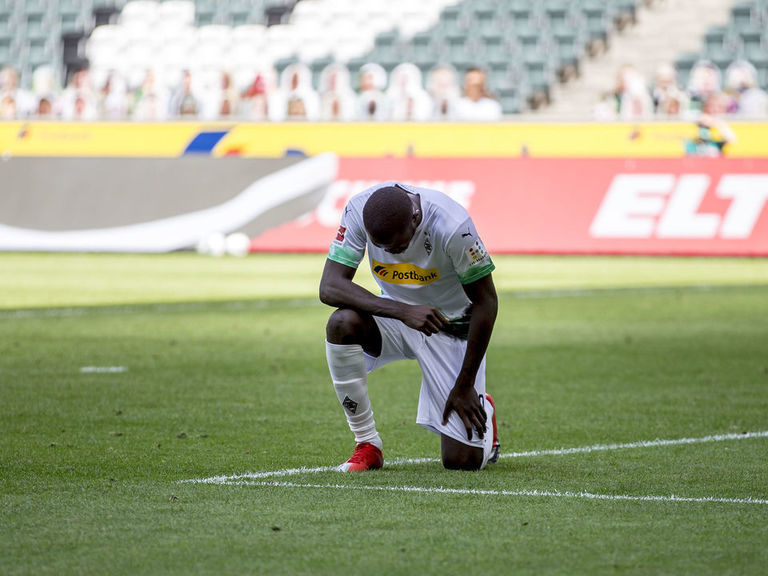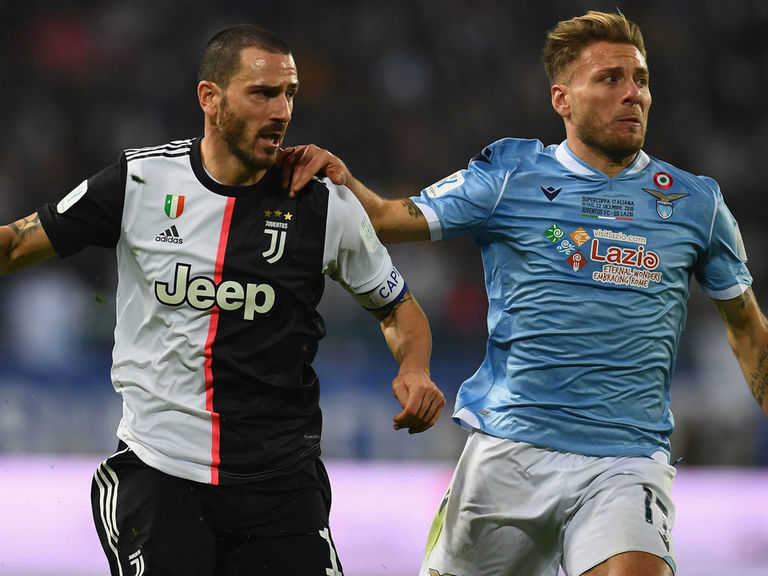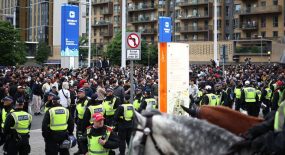CHARLOTTE, N.C. — Retired Carolina Panthers middle linebacker Luke Kuechly is considering a front-office job as a pro scout, the team said Wednesday.
Kuechly, 29, surprisingly retired in January, saying he wasn’t sure if he could play as “fast, physical and strong” as he did during his eight NFL seasons that included seven Pro Bowl selections and the league’s Defensive Player of the Year Award in 2013.
He didn’t explain why he wouldn’t be able to play at the level to which he was accustomed, but Kuechly missed seven games from 2013 to ’17 because of concussions.
FIFA pledged support Tuesday for footballers demonstrating against racial injustice after a now-former police offer killed George Floyd, an unarmed black man, in Minneapolis on May 25.
Last weekend’s displays from Borussia Monchengladbach’s Marcus Thuram, Borussia Dortmund’s Jadon Sancho, and other Bundesliga players led to speculation they could face sanctions if soccer’s authorities construe their acts as political messages.
England’s Premier League said Tuesday it will review players who protest racism on a “case-by-case basis” when play restarts on June 17.
FIFA, however, praised the likes of Thuram and Sancho for their anti-racism messages and calls for justice amid the United States’ ongoing problem with police brutality.
“For the avoidance of doubt, in a FIFA competition the recent demonstrations of players in Bundesliga matches would deserve an applause and not a punishment,” FIFA president Gianni Infantino said in Tuesday’s statement.
He added: “We all must say no to racism and any form of discrimination. We all must say no to violence. Any form of violence.”
Soccer’s world administrative body and its six confederations have been criticized over the years for not adequately dealing with the issue of racism in the sport. FIFA itself set up an anti-racism task force in 2013 before it was dissolved in 2016 after it “completely fulfilled its temporary mission.”
Nevertheless, FIFA stated it has recently made amendments to its disciplinary rules in an attempt to eradicate racism, and it noted the organization’s regular anti-racism campaigns around matches.
The Los Angeles Chargers’ Anthony Lynn wants to do more than make a statement.
Lynn — one of four non-white coaches in the NFL — is feeling frozen by last week’s death of George Floyd in Minneapolis while in police custody and the ensuing protests that have swept across the United States, telling the Los Angeles Times that he isn’t sure what the next step is, though.
“I haven’t done anything to make this a better place for my son,” Lynn told the newspaper on Monday. “I remember having the talk with him when he was 16 about how to handle police, and then at age 30, I called him up and just had the talk with him again because I’m so scared. I want to do something, but to be honest with you, I don’t know what that is.”
Lynn expressed his shock at the death of Floyd, who died May 25 after police offer Derek Chauvin kneeled on his neck for more than eight minutes. But the Chargers coach said he was more dismayed by the three police officers who did not intervene.
1 Related
“You can’t just stand on the sidelines and just watch. You got to say something, man,” Lynn told the Times. “The thing that bothered me the most about (the) George Floyd murder was the three officers that said nothing. The guy who did it, yeah, he’s a (expletive), but the three who stood by and did absolutely nothing … I’m just stunned by that. I see that going on in every organization. I see good people saying nothing and doing nothing, allowing this to happen.”
Lynn said his first attempt to do more was to take part in a protest at Huntington Beach. He said his initial feeling that he was “marching for the right reasons” was diminished when he spoke to a protest leader and discovered the lack of a long-term strategy.
“The protest was there to help people express themselves, but there was no endgame, no plan,” Lynn said. “All of the sacrifice and protest, I wanted to know at the end of this, if something was going to be done. I don’t want to be doing this again 20 years from now, and so I’m looking for ways to sit at the table and have a conversation about this broken system.”
Lynn also discussed Colin Kaepernick’s attempt to bring awareness to issues of police brutality and racial inequality four years ago. Lynn said the message from the quarterback’s decision to kneel during the national anthem was lost — whether intentionally or not.
The Chargers coach also said it was tough for him as an African American to see Kaepernick not given a shot to continue to play in the NFL.
“I know when you look at 32 quarterbacks in the National Football League, Colin could have been one of the 32,” Lynn told the newspaper. “If not, he could have been a quality backup. For me being an African American head coach, this is tough.”
Find line reports, best bets, and subscribe to push notifications in the Betting News section.
The Scudetto race is set to heat up in a big way this summer.
Serie A is slated to return on June 20, with 124 matches scheduled over a 43-day span in an effort to complete the season in a little over six weeks.
At the time the season was suspended, Juventus held a one-point lead over Lazio at the summit.
| CLUB | POINTS | MATCHES PLAYED | GOAL DIFFERENCE |
|---|---|---|---|
| Juventus | 63 | 26 | 26 |
| Lazio | 62 | 26 | 37 |
| Inter | 54 | 25 | 25 |
Despite the narrow lead, oddsmakers have priced the Bianconeri as heavy favorites to win Serie A.
| CLUB | ODDS |
|---|---|
| Juventus | -250 |
| Lazio | +250 |
| Inter | +1400 |
Their quest for a ninth successive Scudetto will begin Monday, June 22 at Stadio Renato Dall’Ara when they visit Bologna.
Here are the remaining fixture lists for the three clubs still in the hunt for the Serie A title. Inter holds a game in hand over the two sides they’re chasing.
| JUVENTUS | LAZIO | INTER |
|---|---|---|
| @ Bologna | @ Atalanta | vs. Sampdoria |
| vs. Lecce | vs. Fiorentina | vs. Sassuolo |
| @ Genoa | @ Torino | @ Parma |
| vs. Torino | vs. Milan | vs. Brescia |
| @ Milan | @ Lecce | vs. Bologna |
| vs. Atalanta | vs. Sassuolo | @ Hellas Verona |
| @ Sassuolo | @ Udinese | vs. Torino |
| vs. Lazio | @ Juventus | @ SPAL |
| @ Udinese | vs. Cagliari | @ Roma |
| vs. Sampdoria | @ Hellas Verona | vs. Fiorentina |
| @ Cagliari | vs. Brescia | @ Genoa |
| vs. Roma | @ Napoli | vs. Napoli |
| N/A | N/A | @ Atalanta |
A quick glance at the remaining schedules shows Lazio are at a clear disadvantage. Seven of their remaining 12 matches are away from home, including daunting trips to Juventus, Atalanta, and Napoli.
Lazio also have the most matches remaining against clubs in the top eight, with four of those five fixtures taking place away from home, as the odds are stacked against Simone Inzaghi’s side. At the current price, I’m steering clear of buying in on the Biancocelesti.
Some aspects of Inter’s remaining schedule are appealing to bettors: They have a game in hand, they have the most home matches remaining (seven), and they play five of the bottom six clubs while avoiding the likes of Juventus and Lazio. Trips to Atalanta and Roma will prove decisive in how seriously Inter are to be taken as title contenders.
No matter which way you spin it, however, it’s hard to dispute that Juventus have the friendliest remaining schedule. Eight of their remaining 12 matches come against clubs sitting 10th or lower in the table, while all three of their matches against the top six clubs take place at home.
A visit from Lazio on July 20 is the biggest hurdle for Juventus to clear in their Scudetto chase. Should they beat their nearest title challengers, it’s hard to see them being dethroned.
All signs point to Juventus finishing the season strong and securing a ninth successive Serie A title, and I wouldn’t shy away from laying -250. But if you’re looking for a ‘dog to back, I’d much rather be invested in Inter at +1400 than Lazio at +250.
Alex Moretto is a sports betting writer for theScore. A journalism graduate from Guelph-Humber University, he has worked in sports media for over a decade. He will bet on anything from the Super Bowl to amateur soccer, is too impatient for futures, and will never trust a kicker. Find him on Twitter @alexjmoretto.
















